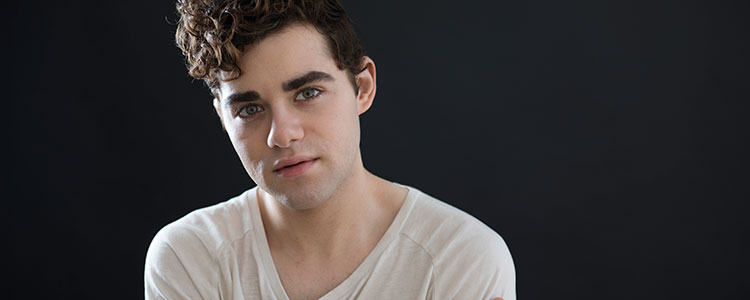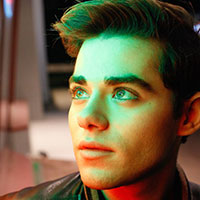Every Day – Taking Recovery One Day at a Time.
Imagine you take one of those vibrating back-massagers (the kind that look like little plastic squid creatures you might find at a CVS) and place it on the back of your head. Then, use duct tape to secure the massager to your head by wrapping the tape around your jaw – kind of like a birthday party hat. Go ahead and turn the device on.
Now, whatever you do as you go about your day, you will always have this thing in the background vibrating against your skull. Sometimes it’s vibrating so hard, you can barely think about anything else. Sometimes it’s so faint, you can almost forget it’s strapped to your head at all. But it’s always there, securely held in place, constantly buzzing.
For me, that is what it feels like to live with an eating disorder.
The constant buzz is the voice in my head. Telling me what I can/can’t eat and how my body isn’t “good enough.”
I was diagnosed with an eating disorder and hospitalized in 2009. From there, I hopped around various treatment facilities until 2013, essentially missing out on my high school education altogether.
You could say I didn’t exactly have my sh*t together.
Fast-forward: I’m now a college graduate living in New York, working as an actor. To many people, my life now would qualify as objectively successful. I’ve been fortunate to find work as a performer, I have a solid group of friends, I’m actively dating, and I’m making a solid go of it in one of the most unforgiving cities in the country.
I’ve been out of treatment for several years now. I saw all the doctors, learned all the coping skills, and got to know myself and my distorted relationship with food very well.
So, what now?
This is the part I wasn’t prepared for. For some reason, I always had it in my head that recovery was this epic war to be won or a mountain I could climb to the top of. I assumed there would come an end point when I could finally unstrap that endlessly buzzing massager from my head and I would be “free.”
Unfortunately, I’m finding out, it doesn’t work that way.
Recovery from an eating disorder isn’t a final destination. In fact, for me, it has become a lifetime commitment – a daily struggle. Don’t get me wrong. I love my life, and I’m so grateful for where it has led me so far. But I’d be lying if I said that my recovery has been a cakewalk.
(See what I did there? Pro tip: It’s important to laugh.)
It’s complicated.
As I move through my life, I’m discovering that the complex side of eating disorders is rarely discussed. All too often we are presented with a very cookie-cutter picture of what eating disorders are and who they affect.
(Something along the lines of angsty young women flipping through magazines and rebelling against their parents. Sound familiar?)
But the fact is people of all genders, races, ages, and orientations navigate their lives while coping with ED.
Anyone can suffer from an eating disorder, and many do so in silence – unbeknownst to the people around them.
An eating disorder can and does affect every part of a person’s life. And even as I strive to live my life in recovery, I find that staying “healthy” is not nearly as black-and-white as eating my three square meals. I’ve actually found that navigating my day-to-day life while dealing with my ED feels more like a constantly shifting gray-area.
So, I have to find ways to check-in with myself.
Small victories.
Especially when things get tough, and the buzzing in my head becomes especially aggressive, I find it vitally important to cherish the “little” wins.
- Grabbing a bite with a friend at a restaurant, in spite of my anxiety over eating out.
- Redirecting my mental energy toward something productive, such as spending a solid chunk of time working on a project or script.
- Enjoying a game night or some other social event, where I’m actively striving to be in-the-moment with the people I love.
The list goes on. My point is, if I am able to check off at least one of these things in a day, even if it’s as small as getting out of bed in the morning, I proudly call it a win.
Find your people.
This is huge. You don’t have to bare your soul to every human you meet. To be frank, for many of my friends, reading this post will be the first time they’ve heard of my history with ED. But it’s important to have a core group of people – even one or two – that you can turn to.
An eating disorder can be an incredibly lonely disease that leads to a lot of isolation. It’s often why so many people suffer from ED quietly, without others around them ever knowing. This especially presents a problem when an individual seems “alright” or “normal” to the outside world.
In rehab, I would sit at the communal dinner table with architects and engineers, mothers with children at home, and even a medical student. We were all there together, being treated for the same disease. It truly can affect anyone – no matter how they might seem on the outside.
Acknowledge the big challenges.
Let’s face it: as a culture, our relationships with food and body image are complicated. Even with body-positivity becoming more prevalent in the media, triggers and challenges will always be a part of daily life.
My biggest challenge is working in the entertainment industry.
My work, by nature, breeds body image negativity. It’s a sad but real truth about the career I chose. I don’t think I could go a month doing my job without someone commenting on my physical appearance, my weight, my “body type” – and the words are not always kind.
It’s not easy. It’s not fun. Sometimes it feels impossible to reconcile being a performer while maintaining a healthy relationship with food.
See what I mean? Not as simple as three square meals.
We can’t simply ignore the fact that maintaining a healthy body image is tricky in today’s culture. Instead, it’s about continuing the conversation on how people dealing with ED can best navigate these challenges in a reasonably healthy way.
What’s left to do?
Keep the conversation going. As I begin to use my platform as an artist to boost awareness about eating disorders, I’m realizing how important it is to highlight the complex nature of recovery. So many different people deal with eating disorders, and many feel that recovery is an impossible goal.
Please take it from me, that’s not true.
My next step.
I’ve decided to join the conversation by writing my first film about eating disorders, titled E.very D.ay.
I’m co-producing it along with a dear friend of mine who has been instrumental in my recovery. Our goal is to bring awareness to just how far-reaching the effects of ED can be, and how many different kinds of people it can affect. We’ll be starting production soon.
So for now, tomorrow, and every day for the rest of my life, I’ll be in recovery.
I’ll live day-to-day, appreciating the small victories, and forgiving myself when I fall down. Making every effort to enjoy the life I’m living, and to find those amazing moments when I’m able to tell that buzzer strapped to my head to shut the hell up for a bit.
With any luck, I’ll be able to use my artistic work to create awareness – and with awareness comes a better chance for those living with eating disorders to find their way to recovery.
Misha Osherovich is an actor/filmmaker based in New York. Recent credits include; A CLOCKWORK ORANGE off-Broadway, and his latest film THE GOLDFINCH will be released in theaters next year.
Misha is currently producing his first short film, titled E.very D.ay, about eating disorders. He aims to continue using his platform as a performer to promote eating disorder awareness.
@mishaosherovich / mishaosherovich.com
Photo Credits: B.LIU Studio; Tom Hornberger





